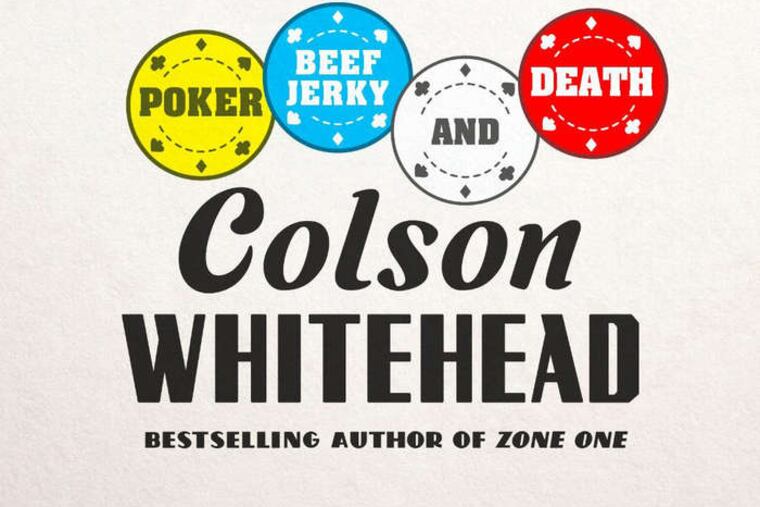"The Noble Hustle": Poker for losers
'I have a good poker face because I am half dead inside," begins The Noble Hustle. He had me at "half dead."

The Noble Hustle
Poker, Beef Jerky, and Death
By Colson Whitehead
Doubleday. 256 pp. $24.95
nolead ends nolead begins
Reviewed by Rathe Miller
'I have a good poker face because I am half dead inside," begins The Noble Hustle.
He had me at "half dead."
From the first sentence to the last, Colson Whitehead never stops being clever - and never stops kvetching.
In 2011, the sports site Grantland.com staked the acclaimed novelist $10,000 to enter the main event of the World Series of Poker (WSOP) in Vegas. If Whitehead played poker as well as he writes, he would have made the final table.
I own more than a hundred poker books and many of them tell much this same tale. A writer and/or player takes us on his quest to win the game's Holy Grail - a WSOP bracelet. The best of these books is Positively Fifth Street, in which writer and amateur player James McManus, on assignment for Harper's, brilliantly captures the story of how he does make it to the final table.
But while McManus could play, Whitehead portrays himself as "one of the most unqualified players in the history of the big game." He has zero casino tournament experience. On top of that, he has only six weeks to "train."
But wait, there's worse! The conceit in Noble Hustle is that Whitehead is "a hapless loser." He's divorced, has no driver's license, sees a shrink. "Bowed and half-broken," he lives in a "crappy" New York apartment, but he dwells in his mythic "Republic of Anhedonia," where no citizen experiences pleasure. He is "skinny, but morbidly obese with doom."
So we tag along with Whitehead-cum-Schopenhauer-cum-Woody Allen as he gets a poker coach, reads poker books and takes day trips to Atlantic City to practice in small tournaments, all the while picking up and dropping off his daughter - "the kid" - at school.
To turn himself into a "Living Poker Weapon" in six weeks, Whitehead devises a "Rocky-style" training program:
Give up reality TV, except for The Biggest Loser: "My failures possessed a weight, I carried them around."
Floss: "All our hopes and dreams are but insubstantial creatures, prey to chance and human frailty. But still, take care of yourselves, people."
Preserve "essence": "It was brought to my attention that preserving my 'essence' meant no self-abuse. Stamp this part of my training REVISED."
Training completed, more or less, it's off to Vegas.
And what a fun trip! Or should I say, what a terrible trip. Every aspect of the poker world falls under Whitehead's jaundiced eye. The players, the card rooms, the "Leisure Industrial Complex," to which the game has become subservient - all are subjected to both his literary sensibilities and his chronic case of "existential Montezuma's revenge."
Ergo, his explication of the "ranking of the hands" (de rigueur in every poker book): "A straight is five misfortunes, but a mix of social, professional, and health-related misfortunes. They are 'differently suited.' A flush would be five misfortunes of the same kind. Gamey tooth, itchy eyeballs, heart palpitations, necrotic finger, incipient flatulence."
Of course, the whole loser thing is shtick for the book. Whitehead didn't graduate from Harvard, write five novels and a book of essays and win a huge pot of writing awards by "lying around in a neurotic stupor."
But shtick happens. The other characters and the relationships in the book - what few there are - are superficially drawn. The only real-world emotional resonance is conveyed through passing mentions of "the kid." The guy warned us he was half dead inside.
The cultural references run mostly along the Scarface/Godzilla continuum. But enough Buñuel, Emerson, and Nathanael West sneak through to remind you that it's a MacArthur Foundation "genius" who wrote the book. Beckett's dictum "Fail again. Fail better" gets Whitehead-poker-ized: "Grind. Fail. Grind better."
The book's errors are few and small: in the 2000 main event James McManus finished fifth, not third; a "Sit-and-Go" is usually, but not always, a "one-table, ten-player tournament." And the "final showdown" in Rounders takes place in the villain KGB's underground lair, not the Trump Taj Mahal. Make no mistakes with the Bible movie of poker.
What happens to Whitehead at the WSOP? Spoiler alert: Nothing much. He predictably gets knocked out on the second day of the 10-day event. One of the other 6,865 entrants wins the $8.7 million first prize and the diamond bracelet.
But while he does not cash, he does learn three things. "One, do not hope for change, or the possibility of transcending your everyday existence, because you will fail. Two, if people put their faith in you, you will let them down. Three, everything is a disaster."
There was a fourth item, but he's saving that for "the kid."
AUTHOR APPEARANCE
Colson Whitehead "Noble Hustle" with Nikil Saval, "Cubed: A Secret History of the Workplace"
7:30 p.m. Tuesday at the Free Library of Philadelphia, 1901 Vine St.
Admission: Free. Information: 215-567-4341 or www.freelibrary.org EndText